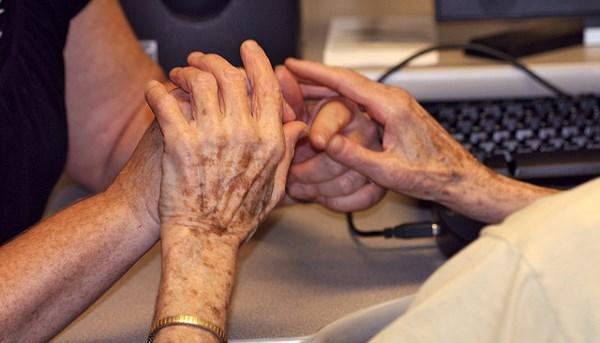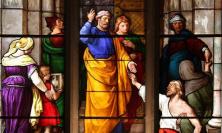We are assured by St Paul in Sunday’s Second Reading that ‘anguish, or distress, or persecution, or famine, or nakedness, or peril, or the sword’ cannot keep us from the love of Christ. Sheila Keefe thinks that it is our safety from these afflictions that enables us to reach out of ourselves to build God’s Kingdom, a place where this safety is manifest. And this is not just true of people of faith: those who don’t recognise God’s love as the source of their safety play their part in building the Kingdom, too.
Every now and then one comes across a phrase or a sentence which opens up a whole new perspective on a familiar theme. Recently, as I was reading a Richard Rohr meditation, the following phrase did just that:
People of faith see the world from a safe place.
This short sentence seems to me to be the basis of a simple but powerful way of explaining the Good News to people today who do not recognise the presence of God at the centre of their lives.
Safety is an issue that affects us all; our desire for it determines so many of our thoughts, words and actions. We spend our lives seeking to build a safe place for ourselves, trying to protect our wealth, health, freedom, success, reputation or life itself, knowing all the time that we could lose any of it in a moment. We lock our doors against anyone who seems to threaten our comfort or security. But if we just stop and think, we would see that we are looking for safety in the wrong place: the place we build for ourselves is not a safe place.
If only we knew we already have a safe place, we would be set free from the fears that drive us into serving our own interests and putting up barriers against perceived threats. This is precisely the confidence that faith holds out for us: ‘You alone, O Lord, make me lie down in safety’ (Ps 4:8). Jesus tells us not to worry about seeking this-worldly comfort and safety, but to set our hearts on the safe place that is the Kingdom of God, and everything we need will be given to us (Matt: 6:25-34). St Paul takes up this theme in his Letter to the Romans, when he assures us that the power of God will be victorious over hardships, distress, persecution, lack of food or clothing, threats and violence – all of these threats from which we try to protect ourselves in fact do nothing to jeopardise the safety that we find in God (Rom 8: 36-37).
But where is that Kingdom of God, that safe place? I used to think it was in Heaven, for us to enjoy after we die if we have led good lives, but I found the real meaning of God’s Kingdom in 1985 when I was one of three members of the Brentwood diocesan Justice and Peace Commission who went to South Africa to forge a link between our diocese and the mainly Zulu diocese of Dundee in Natal, South Africa. It was during the days of apartheid and I had never in my life witnessed poverty and suffering like this - chicken-run homes packed closely together, pot-bellied children and parched land from which to scratch a living. On the first Sunday after our arrival we were taken to Mass in a black township called Madadeni and enjoyed our first experience of Zulu worship. Soon the packed congregation was singing, not in the reluctant, hesitant tones of an English congregation but with full hearts and voices, their whole bodies responding to the rhythm and volume of the music. They were singing about God’s Kingdom, where their tears would be wiped away, where their hunger would be satisfied, where their children would be safe from snakebites, where their dwellings would be safe from the bulldozers and where they would be recognised and welcomed for their unique giftedness. And in the following days, we saw little corners of this kingdom being built before our eyes, through the dedicated leadership and guidance of missionary priests and sisters: in the homes and villages scattered across this vast mission, in an orphanage for children who had lost their parents through malnutrition or violence, in health centres, schools and rest homes for the elderly. I was reminded of Jesus’s words: ‘Go and tell John what you have seen and heard; the blind see, the lame walk, lepers are cleansed, the deaf hear, the dead are raised, the poor have good news brought to them’ (Luke 7: 22).
The builders of the kingdom are not always people whom we would describe as ‘people of faith’, those who frequent public places of worship. Ministries to the poor, the sick, the stranger and the sinner abound in our world. Here at home, even during the recent recession, we have seen people piling non-perishable foods into food banks; the response to droughts, floods and humanitarian disasters can run into millions of pounds; we hear victims of violence forgiving those who have killed or hurt their loved ones; individual caregivers all over the country look after their friends and relatives; and, despite media reports, hospitals and care homes are filled with caring staff.
What surprises me is that so many of these people do not see any spiritual motivation for what they do; certainly they would not recognise the infinite value of their loving outreach in building God’s Kingdom. My husband and I have been greatly helped, especially during recent illness, by fellow parishioners but also by so many kind, non-churchgoing neighbours and friends: they have cooked us special dishes, taken us out and taken time out of their busy lives to be with us when we needed them – and all without the faith and spiritual support that I enjoy. I feel God’s presence, his love, being poured out to us through them; they are building his kingdom of life, peace, freedom, home and happiness in our small corner of the world, whether or not they are aware of it.
I believe that every person has a safe place hidden away in the depths of our being, and that safety sets us free to reach out to others in generosity, forgiveness, service and welcome – all building blocks of God’s kingdom. My faith teaches me that that safe place is the presence of God in our lives, but how am I to communicate this to others who may not see their own safe place with the eyes of faith? John comes to the rescue! He tells us that ‘God is love and anyone who lives in love lives in God, and God lives in him’ (1 John 4:16). Like the word ‘safe’, ‘love’ is a word that is familiar to and really matters to everyone, regardless of their faith. ‘Love’, Richard Rohr says, ‘is the presence of God in us’. It is love – or, as I would say, God – that is the foundation of our safe place, but also the inspiration to move beyond it. With it, we can overcome our fears and reach out of our comfort zone: to share, to forgive, to serve and to welcome one another; all those things that seem to threaten our safety but in fact lift us into a whole new way of seeing and living our lives, ‘freed from fear and saved from the hands of our foes …’ (Luke 1:73)
By way of example: Linda, who worked as a carer for the local council, had stopped attending Mass many years ago but accepted an invitation to join a Keeping In Touch small group for returning Catholics. During one meeting she shared with the group how difficult it was for her to pray. Imagine her surprise and delight to learn that her prayer was in her hands as she washed, dressed and fed those she cared for, in her ears as she listened to their stories and on her lips as she cheered them and made them laugh. For Linda, God became not a stern and distant figure but a presence deep within her, protecting her and motivating her ministry of care.
We hear a lot in the Church these days about the New Evangelisation, which challenges us to find ‘a new language to communicate with the people of today.’ Perhaps what we are really trying to do is to encourage those outside – and even inside – the Church to ‘see the world from a safe place’, and to help them recognise and nourish that special place, the love of God hidden in each one of us and longing to reach out to build God’s kingdom of life, peace, freedom, home and happiness. I am deeply aware of our need for the support and nourishment of the Sacraments and the church community to help us on our faith journey. I believe, however, that there is a danger that in proclaiming our own faith we fail to recognise the presence of God working so wonderfully in the lives of so many of those people we seek to attract to our churches. Like St Paul, who used their ‘unknown god’ to convert the Athenians (Acts 17:23), perhaps we could use the love that is already an important part of the lives of those we reach out to as part of our evangelisation.
Sheila Keefe is a member of KIT (Keeping in Touch, a parish-led programme reaching out to all local Catholics, whether or not they go to church, through home visiting and small group meetings. Get in touch at: [email protected].






